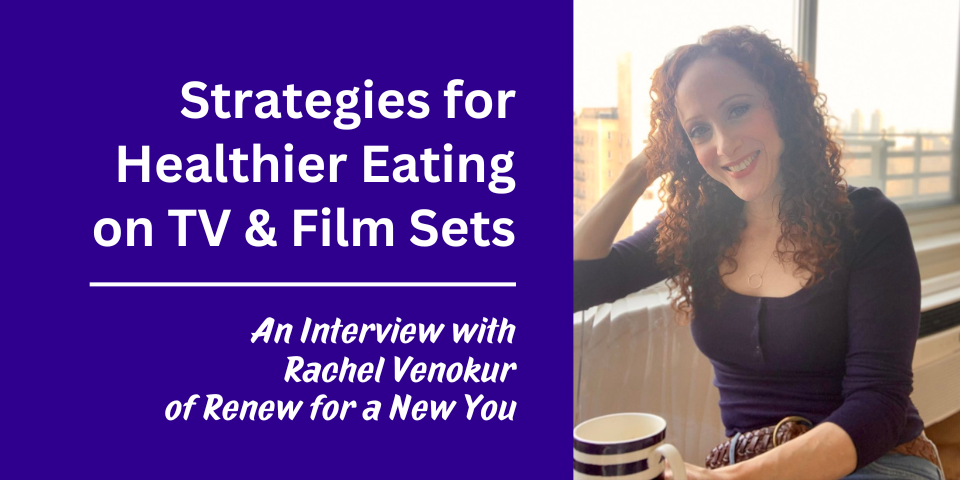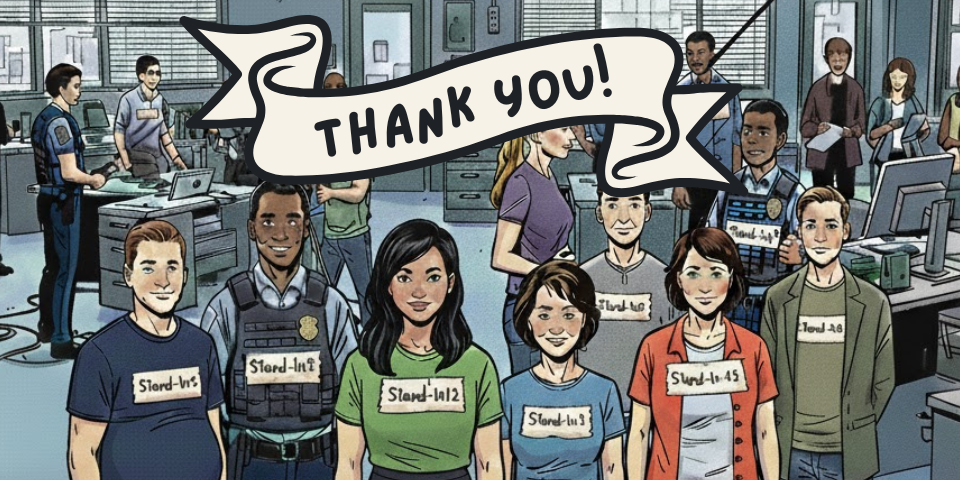Rachel Venokur of Renew for a New You is an author and health coach, who helps clients learn coping strategies around nutrition and emotional well-being, especially those suffering from autoimmune and other chronic conditions.
She’s also the wife of the editor of Stand-In Central, so Rachel has seen and heard many accounts of stand-ins’ struggles of eating on set amid long, erratic work hours, unhealthy food options, and dietary restrictions.
With New Year’s a time when many people re-evaluate their eating, what better time to interview Rachel on strategies for stand-ins around food on set? Give a read!
— The Editor
When it comes to stand-in work, you’re lucky if you report to work and know anything about the food ahead of you.
The day-playing stand-in might report to a new set not knowing crew call, so not knowing when meals will be. Or even if the stand-in is reporting at crew call, there’s no guarantee the crew will break six hours later for lunch — or break at all. So, the question is not necessarily when will lunch be, but, “Will lunch be?”
The stand-in might have no idea how long the day will be — four hours? fourteen hours? — and probably will have no idea what the menu for the meals will be. Will the salads be gross? Will the vegetables be slathered in oil? Will there be secret cheese or gluten in seemingly vegetarian items? Will crafty have anything healthy?
And the stand-in probably can expect no access to a fridge or a microwave — or sometimes not even access to food, if the shooting location restricts food and crafty is far away.
Dietary Chaos
If the stand-in works regularly on a job, this unpredictability day in and day out can lead to chaos in the stand-in’s dietary life. Without strategies for coping with the unhealthy food options, with odd, inconsistent eating hours, and with limits around personal food prep and storage, working as a stand-in and eating healthy can be two objectives that don’t mix well — and cause real health and wellness problems for the vulnerable stand-in.
I should know. As a stand-in, at times I’ve worked long hours six days a week on two different jobs with different catering options, most of which were either unhealthy or digestively problematic. The long hours of work meant a real challenge getting to the grocery store for ingredients or finding time to prep, especially when Sundays were filled with other work. I was also prioritizing early morning workouts or marathon training, which have their own nutritional demands.
The exhaustion almost always leads to making poorer food choices on the job practically out of desperation for not having any options that I might typically have at home. The pining for energy or happiness amid exhaustion and unhappiness meant at times of vulnerability reaching to a suboptimal food with excess sugar and fat, or inevitably snowballing into making eating choices I would rarely see myself making at home.
An Interview with Author & Health Coach Rachel Venokur
Do you get it? If so, listen to some strategies Rachel Venokur has for stand-ins. I interview the owner of Renew for a New You, covering a number of topics of interest to stand-ins concerned about on-set eating.
Rachel covers the topics of choices to make, how to strategize on-set eating, and even how to approach dietary restrictions some stand-ins have (whether for health reasons or for ethical reasons).
Rachel also has ebooks for download on a variety of nutrition topics, and she offers health & nutrition coaching services for stand-ins and others in the entertainment industry who need help approaching eating on set.
Have a read of our interview with health coach Rachel Venokur!
Interview with Rachel Venokur
STAND-IN CENTRAL: You’ve lived with a stand-in who had worked long periods of time on jobs. What stresses do you see stand-ins go through about eating when on the job?
RACHEL VENOKUR: There are number of physical and emotional things that can be triggered for someone when the feel they don’t have control over their food choices. It can range from: “What if I am starving and there is nothing I like available?” To: “What if there are only foods that I know give me digestive issues?” To: “What if there are only unhealthy options?”
There can be anxiety that comes up for some, especially for those who try to eat healthy off set or have/had any disordered eating. Some may feel out of control or overwhelmed, or concerned about using public bathrooms–which can lead to not eating enough food throughout the day or overeating for fear there may not be anything else they want later in the day.
SIC: Say that a stand-in accepts a long-term job on a TV show or movie that sometimes shoots at a studio and sometimes shoots on location, working him/her 12-14 hours a day about five days a week. What are general strategies you’d recommend for that stand-in in considering how to handle eating on set?
RACHEL: I’ve seen a lot of people start a job on set at a healthy weight only to gain weight as the job goes on due to lack of time for exercise and lack of healthy food choices. It can be challenging without really setting yourself up for success.
I am a big believer in bringing your own snacks or meals. For example, I am a vegan. When I used to travel for work, I always packed healthy snacks so I would have something for breakfast and something for the end of the day in case we went to a steakhouse for dinner and I was forced to only eat a side salad. I’d bring something like nuts or a protein bar in my work bag for during the day. I always had something to fuel me.
You have to plan ahead and to be prepared. If you care about your health, your weight, your energy levels, and your digestion, you’ll want to try and keep your normal way of eating as much as possible.
But, if you find yourself on set, it may pay off to make friends with catering. Scope out the healthiest options at crafty. Sometimes we just have to ask for what we want. You won’t know if they can make a small adjustment for you if you don’t ask.
Also, there is typically a flow to the meals on set. Perhaps you can have breakfast at home, to take care of one meal. If you don’t want to bring an entire meal with you, you can bring healthy snacks in case the late afternoon crafty-meal is something you can’t have or don’t want to have.
At a minimum, take a look at all the optionsk and try to see what you can tweak on your own or by asking the caterers.
SIC: Some stand-ins have dietary restrictions. Either they know certain foods give them dietary distress, or they are vegetarian or vegan, or they even have health conditions like autoimmune disorders. What are some ideas you recommend for them as they approach working on a set?
RACHEL: If you have dietary restrictions, you can’t assume there will be options for you. You have to plan ahead.
For example, as a vegan, if I was going to be on a new set tomorrow for 16 hours, I would need to prep food ahead of time. Without knowing the typical options for this production, I would need to have enough food with me, that I can feel confident I won’t starve.
The key here is to be prepared. There is always a way to bring something with you. It really is a must if you have dietary restrictions or health issues. You will feel way less stressed when you know you have what you need.
SIC: Arguably, it’s rare for stand-ins to have access to a refrigerator, a microwave, or a stove on their jobs. Given that, do you have any recommendations for stand-ins who might be inclined to bring their own food to work?
RACHEL: I would think about bringing a cooler bag with a simple pre-cooked meal like brown rice, a veg and a protein like beans or tofu in a small to-go container mixed, ready to eat. I would also consider bringing green juices, fruit, protein bars, granola, or nuts. I would be sure to bring some protein powder or greens powder that I could just mix with water for extra energy and nutrients.
You may need to get creative depending on what size bag you bring with you, but there are ways options. It may not be the most exciting options, but you know you won’t starve or be forced to make choices you would not normally make off set.
SIC: You’ve published several ebooks on eating. Can you explain what people don’t seem to realize about eating, and how readers can benefit from learning about healthy eating from your ebooks?
RACHEL: I have two ebooks. One is on plant-based eating and one on autoimmune disease. Both offer guidance and help on how to make healthy choices on a regular basis, and both have easy meal plans and snack ideas. If you want to be prepared, but are not sure how, you can start with these two books. I also offer coaching around meal planning based on your needs and preferences.
In these modern times, it is rare that there won’t be something on set that is healthy enough for you not to spiral into a whole day of poor choices. Also, I am believer in knowing your “why.” Why is it important for you to eat well? Why do try to make healthy choices on or off set? Why is your health something you should be thinking about?
Without a “why,” it can be hard to make the best choices when you are presented with unhealthy options. The stronger your “why,” the easier it is to break your food patterns and create new healthy habits.
Most of us are always striving to eat healthier and feel better. Are you are looking to take back some control of your energy, your pain, reduce your chronic health symptoms, control your weight, enhance your sleep, and more?
Being prepared on set, having a game-plan for the day will not only help you feel better physically, but it also allows you to control what is in your control: what you choose to eat. It is all in your control as long you are prepared.
Click here to contact Rachel Venokur to discuss health & nutrition coaching.
What new ideas did you pull from this interview? How have you managed eating healthfully on set? Share your thoughts in the comments below!
Discover more from Stand-In Central
Subscribe to get the latest posts sent to your email.








Leave A Comment